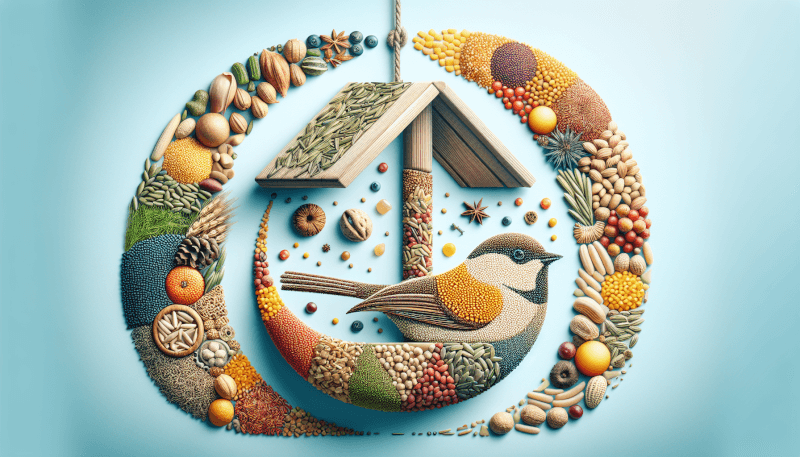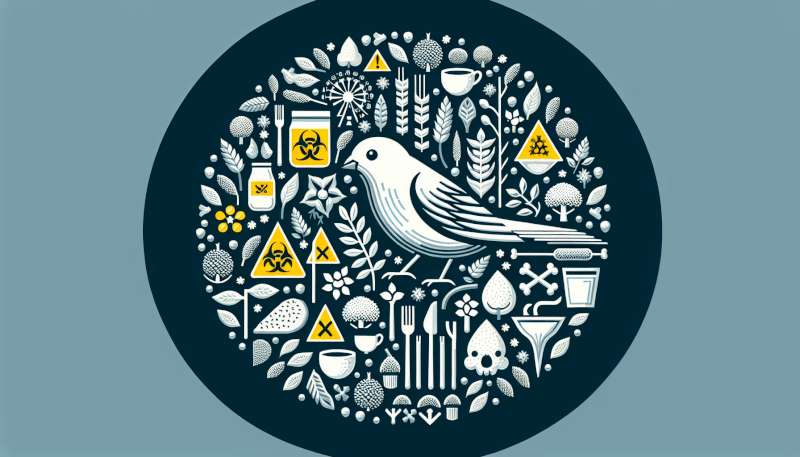Are you a proud bird owner? If so, it’s essential to ensure that your feathered friend is receiving the best nutrition possible. In order to promote their optimal health and well-being, it’s important to be aware of the key ingredients to avoid in bird food. By steering clear of these potentially harmful components, you can ensure that your beloved bird stays healthy and happy for years to come. With a little knowledge and attention to detail, you can provide your feathered companion with a diet that truly supports their overall health.

Artificial Preservatives
Butylated Hydroxyanisole (BHA)
Butylated Hydroxyanisole (BHA) is commonly used as an artificial preservative in bird food. While its purpose is to extend the shelf life of the product, it is important to note that BHA has been linked to various health concerns. Studies have shown that BHA can potentially cause allergic reactions, skin irritations, and even carcinogenic effects in animals. Considering the adverse effects it may have on our feathered friends, it is advisable to opt for bird food that does not contain BHA.
Butylated Hydroxytoluene (BHT)
Similar to BHA, Butylated Hydroxytoluene (BHT) is another artificial preservative that is commonly found in bird food. Although its use is intended to prevent oxidation and spoilage, BHT has been a topic of concern due to its potential negative impact on health. Some studies have suggested that BHT could have carcinogenic properties and could also affect the liver and thyroid function in animals. When selecting bird food, it is wise to choose options that do not contain BHT.
Ethoxyquin
Ethoxyquin is yet another artificial preservative that is often used in bird food to prevent the spoilage of fat in the product. While it may be effective in prolonging the shelf life, there are concerns about its safety. Ethoxyquin has been associated with various health issues, such as allergies, skin reactions, liver dysfunction, and even certain types of cancer. To prioritize the well-being of your feathered companions, it is recommended to avoid bird food that contains ethoxyquin.
Artificial Colors
Red 40
Red 40 is a commonly used artificial color additive in bird food. It provides an attractive hue to the food, making it visually appealing to both pet owners and birds. However, it is important to consider that red 40 is derived from petroleum and has been associated with adverse effects on health. Some studies have linked red 40 to hyperactivity and allergic reactions in animals. To promote optimal health in your birds, it is advisable to choose bird food that does not include red 40.
Yellow 5
Similar to red 40, Yellow 5 is an artificial color additive that is frequently used in bird food. It imparts a vibrant yellow color and enhances the visual appeal of the food. Nevertheless, it is crucial to recognize that yellow 5 has been associated with certain health concerns. It has been linked to hyperactivity, allergic reactions, and even asthma symptoms in animals. Opting for bird food that does not contain yellow 5 can help ensure the well-being of your feathered friends.
Blue 2
Blue 2 is another artificial color additive commonly used in bird food to provide a captivating blue shade. Despite its visually appealing properties, blue 2 has been a topic of concern due to potential health risks. Some studies have indicated that blue 2 could have adverse effects on behavior and brain function in animals. To prioritize the optimal health of your birds, it is advisable to look for bird food options that do not include blue 2.

Artificial Flavors
Artificial flavors are frequently added to bird food to enhance palatability and make it enticing for birds to consume. However, it is important to note that these artificial flavors are often derived from synthetic chemicals and may not offer any nutritional value. Additionally, some birds may have sensitivities or allergies to certain artificial flavors, leading to adverse reactions. To provide the best diet for your avian companions, it is recommended to choose bird food that uses natural flavors or no added flavors at all.
Added Sugars
While sugars occur naturally in fruits and other plant-based ingredients, added sugars are unnecessary and potentially harmful additives in bird food. Consuming excessive amounts of added sugars can lead to obesity, diabetes, and other health issues in birds. It is essential to select bird food that is free from added sugars or has only minimal amounts, allowing your birds to maintain a balanced and healthy diet.

High-Fat Content
Birds require a certain amount of fat in their diet for energy and insulation, but excessive fat content in bird food can have detrimental effects on their health. High-fat diets can contribute to obesity, liver problems, and cardiovascular issues in birds. It is crucial to choose bird food that provides an appropriate balance of fats to support your feathered friends’ overall well-being.
Genetically Modified Organisms (GMOs)
Genetically Modified Organisms (GMOs) have become increasingly prevalent in our food supply, including bird food. GMOs are created through genetic engineering techniques and may have unintended effects on the health of birds. While long-term studies are still ongoing to fully understand the impacts of GMOs, it is advisable to opt for bird food that is labeled as GMO-free, ensuring that your avian companions are consuming ingredients that have not been genetically modified.

Chemical Pesticides
Bird food that has been treated with chemical pesticides can pose potential risks to the health of birds. Pesticides are used to control or eliminate pests, but they can also have unintended negative effects on non-target organisms, including birds. Exposure to chemical pesticides has been associated with various health issues such as neurological problems and reproductive abnormalities in birds. Therefore, it is recommended to choose bird food that is free from chemical pesticides to minimize potential risks.
Processed Soy
Soy is a common ingredient found in bird food, particularly in blends with seeds and grains. However, it is essential to consider the processing methods used on soy as highly processed soy products can lack the nutritional value that untampered soy provides. Additionally, highly processed soy can contain additives, such as artificial flavors and preservatives. To ensure the highest quality and nutritional value in your birds’ diet, it is recommended to choose bird food that includes minimally processed soy products.

Excessive Salt
While a small amount of salt is necessary for birds’ health, excessive salt content in bird food can be harmful. High salt intake can lead to dehydration, kidney problems, and increased blood pressure in birds. It is crucial to select bird food with moderate salt levels to support their well-being and prevent the potential negative impacts of excessive salt consumption.
Artificial Sweeteners
Similar to added sugars, artificial sweeteners are unnecessary additives in bird food. Artificial sweeteners, such as saccharin or aspartame, are often used to provide a sweet taste without the added calories. However, these sweeteners may have potential health risks. Some studies have suggested that artificial sweeteners could disrupt normal metabolism and even lead to weight gain in animals. To prioritize the health of your birds, it is recommended to choose bird food that does not contain artificial sweeteners or added sugars.
By being conscious of the ingredients listed above and choosing bird food options that avoid these additives, you can provide your feathered friends with a healthier and more natural diet. Prioritizing their well-being and promoting optimal health will ensure that your avian companions live a vibrant and fulfilling life by your side.


